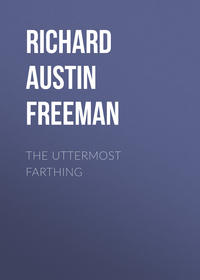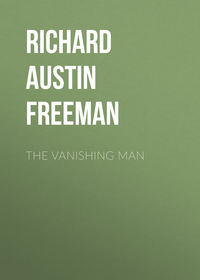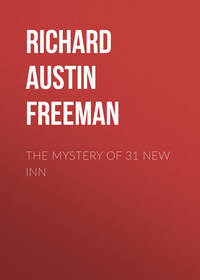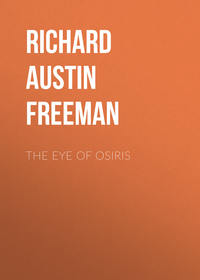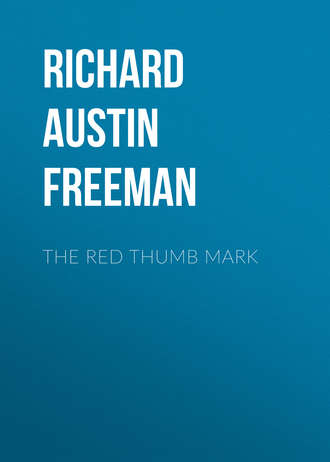 полная версия
полная версияThe Red Thumb Mark
Could it be that Walter Hornby was in reality the miscreant X? The thing seemed incredible, for, hitherto, no shadow of suspicion had appeared to fall on him. And yet there was no denying that his description tallied in a very remarkable manner with that of the hypothetical X. He was a man of some means and social position; he was a man of considerable knowledge and mechanical skill, though as to his ingenuity I could not judge. He had recently bought a second-hand Blickensderfer which probably had a literary typewheel, since it was purchased from a literary man; and that machine showed the characteristic mark on the small "e." The two remaining points, indeed, were not so clear. Obviously I could form no opinion as to whether or not Thorndyke held any exclusive information concerning him, and, with reference to his knowledge of my friend's habits, I was at first inclined to be doubtful until I suddenly recalled, with a pang of remorse and self-accusation, the various details that I had communicated to Juliet and that she might easily, in all innocence, have handed on to Walter. I had, for instance, told her of Thorndyke's preference for the Trichinopoly cheroot, and of this she might very naturally have spoken to Walter, who possessed a supply of them. Again, with regard to the time of our arrival at King's Cross, I had informed her of this in a letter which was in no way confidential, and again there was no reason why the information should not have been passed on to Walter, who was to have been one of the party at the family dinner. The coincidence seemed complete enough, in all truth; yet it was incredible that Reuben's cousin could be so blackhearted a villain or could have any motive for these dastardly crimes.
Suddenly a new idea struck me. Mrs Hornby had obtained access to this typewriting machine; and if Mrs. Hornby could do so, why not John Hornby? The description would, for the most part, fit the elder man as well as the younger, though I had no evidence of his possessing any special mechanical skill; but my suspicions had already fastened upon him, and I remembered that Thorndyke had by no means rejected my theory which connected him with the crime.
At this point, my reflections were broken in upon by Mrs. Hornby, who grasped my arm and uttered a deep groan. We had reached the corner of the Old Bailey, and before us were the frowning walls of Newgate. Within those walls, I knew—though I did not mention the fact—that Reuben Hornby was confined with the other prisoners who were awaiting their trial; and a glance at the massive masonry, stained to a dingy grey by the grime of the city, put an end to my speculations and brought me back to the drama that was so nearly approaching its climax.
Down the old thoroughfare, crowded with so many memories of hideous tragedy; by the side of the gloomy prison; past the debtors' door with its forbidding spiked wicket; past the gallows gate with its festoons of fetters; we walked in silence until we reached the entrance to the Sessions House.
Here I was not a little relieved to find Thorndyke on the look-out for us, for Mrs. Hornby, in spite of really heroic efforts to control her emotion, was in a state of impending hysteria, while Juliet, though outwardly calm and composed, showed by the waxen pallor of her cheeks and a certain wildness of her eyes that all her terror was reviving; and I was glad that they were spared the unpleasantness of contact with the policemen who guarded the various entrances.
"We must be brave," said Thorndyke gently, as he took Mrs. Hornby's hand, "and show a cheerful face to our friend who has so much to bear and who bears it so patiently. A few more hours, and I hope we shall see restored, not only his liberty, but his honour. Here is Mr. Anstey, who, we trust, will be able to make his innocence apparent."
Anstey, who, unlike Thorndyke, had already donned his wig and gown, bowed gravely, and, together, we passed through the mean and grimy portals into a dark hall. Policemen in uniform and unmistakable detectives stood about the various entries, and little knots of people, evil-looking and unclean for the most part, lurked in the background or sat on benches and diffused through the stale, musty air that distinctive but indescribable odour that clings to police vans and prison reception rooms; an odour that, in the present case, was pleasantly mingled with the suggestive aroma of disinfectants. Through the unsavoury throng we hurried, and up a staircase to a landing from which several passages diverged. Into one of these passages—a sort of "dark entry," furnished with a cage-like gate of iron bars—we passed to a black door, on which was painted the inscription, "Old Court. Counsel and clerks."
Anstey held the door open for us, and we passed through into the court, which at once struck me with a sense of disappointment. It was smaller than I had expected, and plain and mean to the point of sordidness. The woodwork was poor, thinly disguised by yellow graining, and slimy with dirt wherever a dirty hand could reach it. The walls were distempered a pale, greenish grey; the floor was of bare and dirty planking, and the only suggestions of dignity or display were those offered by the canopy over the judge's seat—lined with scarlet baize and surmounted by the royal arms—the scarlet cushions of the bench, and the large, circular clock in the gallery, which was embellished with a gilded border and asserted its importance by a loud, aggressive tick.
Following Anstey and Thorndyke into the well of the court, we were ushered into one of the seats reserved for counsel—the third from the front—where we sat down and looked about us, while our two friends seated themselves in the front bench next to the central table. Here, at the extreme right, a barrister—presumably the counsel for the prosecution—was already in his place and absorbed in the brief that lay on the desk before him. Straight before us were the seats for the jury, rising one above the other, and at their side the witness-box. Above us on the right was the judge's seat, and immediately below it a structure somewhat resembling a large pew or a counting-house desk, surmounted by a brass rail, in which a person in a grey wig—the clerk of the court—was mending a quill pen. On our left rose the dock—suggestively large and roomy—enclosed at the sides with high glazed frames; and above it, near the ceiling, was the spectators' gallery.
"What a hideous place!" exclaimed Juliet, who separated me from Mrs. Hornby. "And how sordid and dirty everything looks!"
"Yes," I answered. "The uncleanness of the criminal is not confined to his moral being; wherever he goes, he leaves a trail of actual, physical dirt. It is not so long ago that the dock and the bench alike used to be strewn with medicinal herbs, and I believe the custom still survives of furnishing the judge with a nosegay as a preventive of jail-fever."
"And to think that Reuben should be brought to a place like this!" Juliet continued bitterly; "to be herded with such people as we saw downstairs!"
She sighed and looked round at the benches that rose behind us, where a half-dozen reporters were already seated and apparently in high spirits at the prospect of a sensational case.
Our conversation was now interrupted by the clatter of feet on the gallery stairs, and heads began to appear over the wooden parapet. Several junior counsel filed into the seats in front of us; Mr. Lawley and his clerk entered the attorney's bench; the ushers took their stand below the jury-box; a police officer seated himself at a desk in the dock; and inspectors, detectives and miscellaneous officers began to gather in the entries or peer into the court through the small glazed openings in the doors.
CHAPTER XV
THE FINGER-PRINT EXPERTS
The hum of conversation that had been gradually increasing as the court filled suddenly ceased. A door at the back of the dais was flung open; counsel, solicitors, and spectators alike rose to their feet; and the judge entered, closely followed by the Lord Mayor, the sheriff, and various civic magnates, all picturesque and gorgeous in their robes and chains of office. The Clerk of Arraigns took his place behind his table under the dais; the counsel suspended their conversation and fingered their briefs; and, as the judge took his seat, lawyers, officials, and spectators took their seats, and all eyes were turned towards the dock.
A few moments later Reuben Hornby appeared in the enclosure in company with a warder, the two rising, apparently, from the bowels of the earth, and, stepping forward to the bar, stood with a calm and self-possessed demeanour, glancing somewhat curiously around the court. For an instant his eye rested upon the group of friends and well-wishers seated behind the counsel, and the faintest trace of a smile appeared on his face; but immediately he turned his eyes away and never again throughout the trial looked in our direction.
The Clerk of Arraigns now rose and, reading from the indictment which lay before him on the table, addressed the prisoner—
"Reuben Hornby, you stand indicted for that you did, on the ninth or tenth day of March, feloniously steal a parcel of diamonds of the goods and chattels of John Hornby. Are you guilty or not guilty?"
"Not guilty," replied Reuben.
The Clerk of Arraigns, having noted the prisoner's reply, then proceeded—
"The gentlemen whose names are about to be called will form the jury who are to try you. If you wish to object to any of them, you must do so as each comes to the book to be sworn, and before he is sworn. You will then be heard."
In acknowledgment of this address, which was delivered in clear, ringing tones, and with remarkable distinctness, Reuben bowed to the clerk, and the process of swearing-in the jury was commenced, while the counsel opened their briefs and the judge conversed facetiously with an official in a fur robe and a massive neck chain.
Very strange, to unaccustomed eyes and ears, was the effect of this function—half solemn and half grotesque, with an effect intermediate between that of a religious rite and that of a comic opera. Above the half-suppressed hum of conversation the clerk's voice arose at regular intervals, calling out the name of one of the jurymen, and, as its owner stood up, the court usher, black-gowned and sacerdotal of aspect, advanced and proffered the book. Then, as the juryman took the volume in his hand, the voice of the usher resounded through the court like that of a priest intoning some refrain or antiphon—an effect that was increased by the rhythmical and archaic character of the formula—
"Samuel Seppings!"
A stolid-looking working-man rose and, taking the Testament in his hand, stood regarding the usher while that official sang out in a solemn monotone—
"You shall well and truly try and true deliverance make between our Sovereign Lord the King and the prisoner at the bar, whom you shall have in charge, and a true verdict give according to the evidence. So help you God!"
"James Piper!" Another juryman rose and was given the Book to hold; and again the monotonous sing-song arose—
"You shall well and truly try and true deliverance make, etc."
"I shall scream aloud if that horrible chant goes on much longer," Juliet whispered. "Why don't they all swear at once and have done with it?"
"That would not meet the requirements," I answered. "However, there are only two more, so you must have patience."
"And you will have patience with me, too, won't you? I am horribly frightened. It is all so solemn and dreadful."
"You must try to keep up your courage until Dr. Thorndyke has given his evidence," I said. "Remember that, until he has spoken, everything is against Reuben; so be prepared."
"I will try," she answered meekly; "but I can't help being terrified."
The last of the jurymen was at length sworn, and when the clerk had once more called out the names one by one, the usher counting loudly as each man answered to his name, the latter officer turned to the Court and spectators, and proclaimed in solemn tones—
"If anyone can inform my Lords the King's justices, the King's attorney-general, or the King's serjeant, ere this inquest be now taken between our Sovereign Lord the King and the prisoner at the bar, of any treason, murder, felony or misdemeanour, committed or done by him, let him come forth and he shall be heard; for the prisoner stands at the bar upon his deliverance."
This proclamation was followed by a profound silence, and after a brief interval the Clerk of Arraigns turned towards the jury and addressed them collectively—
"Gentlemen of the jury, the prisoner at the bar stands indicted by the name of Reuben Hornby, for that he, on the ninth or tenth of March, feloniously did steal, take and carry away a parcel of diamonds of the goods of John Hornby. To this indictment he has pleaded that he is not guilty, and your charge is to inquire whether he be guilty or not and to hearken to the evidence."
When he had finished his address the clerk sat down, and the judge, a thin-faced, hollow-eyed elderly man, with bushy grey eyebrows and a very large nose, looked attentively at Reuben for some moments over the tops of his gold-rimmed pince-nez. Then he turned towards the counsel nearest the bench and bowed slightly.
The barrister bowed in return and rose, and for the first time I obtained a complete view of Sir Hector Trumpler, K.C., the counsel for the prosecution. His appearance was not prepossessing nor—though he was a large man and somewhat florid as to his countenance—particularly striking, except for a general air of untidiness. His gown was slipping off one shoulder, his wig was perceptibly awry, and his pince-nez threatened every moment to drop from his nose.
"The case that I have to present to you, my lord and gentlemen of the jury," he began in a clear, though unmusical voice, "is one the like of which is but too often met with in this court. It is one in which we shall see unbounded trust met by treacherous deceit, in which we shall see countless benefactions rewarded by the basest ingratitude, and in which we shall witness the deliberate renunciation of a life of honourable effort in favour of the tortuous and precarious ways of the criminal. The facts of the case are briefly as follows: The prosecutor in this case—most unwilling prosecutor, gentlemen—is Mr. John Hornby, who is a metallurgist and dealer in precious metals. Mr. Hornby has two nephews, the orphan sons of his two elder brothers, and I may tell you that since the decease of their parents he has acted the part of a father to both of them. One of these nephews is Mr. Walter Hornby, and the other is Reuben Hornby, the prisoner at the bar. Both of these nephews were received by Mr. Hornby into his business with a view to their succeeding him when he should retire, and both, I need not say, occupied positions of trust and responsibility.
"Now, on the evening of the ninth of March there was delivered to Mr. Hornby a parcel of rough diamonds of which one of his clients asked him to take charge pending their transfer to the brokers. I need not burden you with irrelevant details concerning this transaction. It will suffice to say that the diamonds, which were of the aggregate value of about thirty thousand pounds, were delivered to him, and the unopened package deposited by him in his safe, together with a slip of paper on which he had written in pencil a memorandum of the circumstances. This was on the evening of the ninth of March, as I have said. Having deposited the parcel, Mr. Hornby locked the safe, and shortly afterwards left the premises and went home, taking the keys with him.
"On the following morning, when he unlocked the safe, he perceived with astonishment and dismay that the parcel of diamonds had vanished. The slip of paper, however, lay at the bottom of the safe, and on picking it up Mr. Hornby perceived that it bore a smear of blood, and in addition, the distinct impression of a human thumb. On this he closed and locked the safe and sent a note to the police station, in response to which a very intelligent officer—Inspector Sanderson—came and made a preliminary examination. I need not follow the case further, since the details will appear in the evidence, but I may tell you that, in effect, it has been made clear, beyond all doubt, that the thumb-print on that paper was the thumb-print of the prisoner, Reuben Hornby."
He paused to adjust his glasses, which were in the very act of falling from his nose, and hitch up his gown, while he took a leisurely survey of the jury, as though he were estimating their impressionability. At this moment I observed Walter Hornby enter the court and take up a position at the end of our bench nearest the door; and, immediately after, Superintendent Miller came in and seated himself on one of the benches opposite.
"The first witness whom I shall call," said Sir Hector Trumpler, "is John Hornby."
Mr. Hornby, looking wild and agitated, stepped into the witness-box, and the usher, having handed him the Testament, sang out—
"The evidence you shall give to the court and jury sworn, between our Sovereign Lord the King and the prisoner at the bar shall be the truth, the whole truth, and nothing but the truth; so help you God!"
Mr. Hornby kissed the Book, and, casting a glance of unutterable misery at his nephew, turned towards the counsel.
"Your name is John Hornby, is it not?" asked Sir Hector.
"It is."
"And you occupy premises in St. Mary Axe?"
"Yes. I am a dealer in precious metals, but my business consists principally in the assaying of samples of ore and quartz and bars of silver and gold."
"Do you remember what happened on the ninth of March last?"
"Perfectly. My nephew Reuben—the prisoner—delivered to me a parcel of diamonds which he had received from the purser of the Elmina Castle, to whom I had sent him as my confidential agent. I had intended to deposit the diamonds with my banker, but when the prisoner arrived at my office, the banks were already closed, so I had to put the parcel, for the night, in my own safe. I may say that the prisoner was not in any way responsible for the delay."
"You are not here to defend the prisoner," said Sir Hector. "Answer my questions and make no comments, if you please. Was anyone present when you placed the diamonds in the safe?"
"No one was present but myself."
"I did not ask if you were present when you put them in," said Sir Hector (whereupon the spectators sniggered and the judge smiled indulgently). "What else did you do?"
"I wrote in pencil on a leaf of my pocket memorandum block, 'Handed in by Reuben at 7.3 p.m., 9.3.01,' and initialled it. Then I tore the leaf from the block and laid it on the parcel, after which I closed the safe and locked it."
"How soon did you leave the premises after this?"
"Almost immediately. The prisoner was waiting for me in the outer office—"
"Never mind where the prisoner was; confine your answers to what is asked. Did you take the keys with you?"
"Yes."
"When did you next open the safe?"
"On the following morning at ten o'clock."
"Was the safe locked or unlocked when you arrived?"
"It was locked. I unlocked it."
"Did you notice anything unusual about the safe?"
"No."
"Had the keys left your custody in the interval?"
"No. They were attached to a key-chain, which I always wear."
"Are there any duplicates of those keys?—the keys of the safe, I mean."
"No, there are no duplicates."
"Have the keys ever gone out of your possession?"
"Yes. If I have had to be absent from the office for a considerable time, it has been my custom to hand the keys to one of my nephews, whichever has happened to be in charge at the time."
"And never to any other person?"
"Never to any other person."
"What did you observe when you opened the safe?"
"I observed that the parcel of diamonds had disappeared."
"Did you notice anything else?"
"Yes. I found the leaf from my memorandum block lying at the bottom of the safe. I picked it up and turned it over, and then saw that there were smears of blood on it and what looked like the print of a thumb in blood. The thumb-mark was on the under-surface, as the paper lay at the bottom of the safe."
"What did you do next?"
"I closed and locked the safe, and sent a note to the police station saying that a robbery had been committed on my premises."
"You have known the prisoner several years, I believe?"
"Yes; I have known him all his life. He is my eldest brother's son."
"Then you can tell us, no doubt, whether he is left-handed or right-handed?"
"I should say he was ambidextrous, but he uses his left hand by preference."
"A fine distinction, Mr. Hornby; a very fine distinction. Now tell me, did you ascertain beyond all doubt that the diamonds were really gone?"
"Yes; I examined the safe thoroughly, first by myself and afterwards with the police. There was no doubt that the diamonds had really gone."
"When the detective suggested that you should have the thumb-prints of your two nephews taken, did you refuse?"
"I refused."
"Why did you refuse?"
"Because I did not choose to subject my nephews to the indignity. Besides, I had no power to make them submit to the proceeding."
"Had you any suspicions of either of them?"
"I had no suspicions of anyone."
"Kindly examine this piece of paper, Mr. Hornby," said Sir Hector, passing across a small oblong slip, "and tell us if you recognise it."
Mr. Hornby glanced at the paper for a moment, and then said—
"This is the memorandum slip that I found lying at the bottom of the safe."
"How do you identify it?"
"By the writing on it, which is in my own hand, and bears my initials."
"Is it the memorandum that you placed on the parcel of diamonds?"
"Yes."
"Was there any thumb-mark or blood-smear on it when you placed it in the safe?"
"No."
"Was it possible that there could have been any such marks?"
"Quite impossible. I tore it from my memorandum block at the time I wrote upon it."
"Very well." Sir Hector Trumpler sat down, and Mr. Anstey stood up to cross-examine the witness.
"You have told us, Mr. Hornby," said he, "that you have known the prisoner all his life. Now what estimate have you formed of his character?"
"I have always regarded him as a young man of the highest character—honourable, truthful, and in every way trustworthy. I have never, in all my experience of him, known him to deviate a hair's-breadth from the strictest honour and honesty of conduct."
"You regarded him as a man of irreproachable character. Is that so?"
"That is so; and my opinion of him is unchanged."
"Has he, to your knowledge, any expensive or extravagant habits?"
"No. His habits are simple and rather thrifty."
"Have you ever known him to bet, gamble, or speculate?"
"Never."
"Has he ever seemed to be in want of money?"
"No. He has a small private income, apart from his salary, which I know he does not spend, since I have occasionally employed my broker to invest his savings."
"Apart from the thumb-print which was found in the safe, are you aware of any circumstances that would lead you to suspect the prisoner of having stolen the diamonds?"
"None whatever."
Mr. Anstey sat down, and as Mr. Hornby left the witness-box, mopping the perspiration from his forehead, the next witness was called.
"Inspector Sanderson!"
The dapper police officer stepped briskly into the box, and having been duly sworn, faced the prosecuting counsel with the air of a man who was prepared for any contingency.
"Do you remember," said Sir Hector, after the usual preliminaries had been gone through, "what occurred on the morning of the tenth of March?"
"Yes. A note was handed to me at the station at 10.23 a.m. It was from Mr. John Hornby, and stated that a robbery had occurred at his premises in St. Mary Axe. I went to the premises and arrived there at 10.31 a.m. There I saw the prosecutor, Mr. John Hornby, who told me that a parcel of diamonds had been stolen from the safe. At his request I examined the safe. There were no signs of its having been forced open; the locks seemed to be quite uninjured and in good order. Inside the safe, on the bottom, I found two good-sized drops of blood, and a slip of paper with pencil-writing on it. The paper bore two blood-smears and a print of a human thumb in blood."


